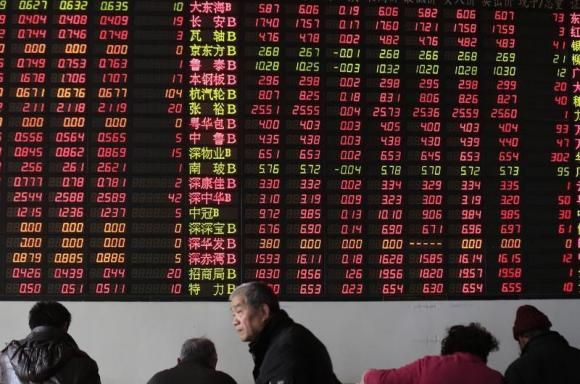Asian Stocks Fall Again On Concerns About Fed Interest Rate Hike, Chinese Economic Data

Asian shares opened lower on Monday amid continuing concerns about the health of China’s economy, and U.S. Federal Reserve Vice Chairman Stanley Fischer’s remarks the Fed had not ruled out an interest rate rise in September. In Tokyo the Nikkei fell by slightly more than 1 percent in morning trading, following news Japanese industrial output had fallen beyond expectations, by 0.6 percent in July. In South Korea, the KOSPI was down almost 0.5 percent, as was Singapore’s Straits Times Index. Australia’s ASX 200, meanwhile, was down nearly 1.2 percent by lunch, local time.
Chinese stocks also opened sharply lower. After recovering more than 10 percent Thursday and Friday -- following a dramatic 18 point fall in the first half of last week -- the main Shanghai Composite Index was down 2.6 percent in Monday morning trading. The secondary index in Shenzhen also fell, by more than 2.2 percent, while the always volatile ChiNext index, for high-tech stocks, which had risen by more than 6 percent Friday, was down almost 3.1 percent.
Hong Kong’s Hang Seng, which had falled more than 1 percent Friday, also opened lower, and had fallen more than 0.7 percent by lunchtime.
Both Shanghai and Hong Kong are facing one of their worst monthly declines for August -- at the start of Monday’s trading both were down some 12 percent on the start of the month.
The falls on China's markets again raise questions about the success of the Chinese government’s attempts to calm investor sentiment. The markets had jumped Friday on news China’s state pension fund would invest more than $300 billion in shares in the near future. And at the weekend the government removed a cap on commercial banks’ loan to deposit ratios -- previously set at 75 percent of deposits -- to encourage lending to businesses, reduce the prevalence of shadow banking and boost the real economy.
That move followed remarks by Chinese Premier Li Keqiang, who told a meeting of China’s top leadership the Chinese yuan would remain “basically stable” following its devaluation of around 2 percent earlier in the month. Li was quoted by state media as saying there was no basis for continued depreciation of the yuan, the economy was generally sound, and China would pursue a “proactive fiscal policy and prudent monetary policy.” The official Global Times newspaper said Monday Li’s comments “should help restore investor confidence.”
However, anxiety remains about latest figures on China's factory performance due to be released Tuesday. And the Global Times quoted economic forecaster Xu Hongcai as saying GDP growth might fall to 6.8 or 6.9 percent in the third quarter, below the second quarter official figure of 7 percent, as a result of slowing exports and the falls in the stock market. However, Xu predicted monetary easing would see a return to growth of 7 percent in the final quarter of 2015.
Chinese state media also continued to emphasize the government’s line that recent market volatility is partly linked to illegal manipulation. State TV at the weekend showed an interview with Wang Xiaolu, a reporter from influential financial news magazine Caijing, in which he confessed to making mistakes in his reporting of a story last month that predicted the government was planning to stop its large-scale intervention to prop up the country’s stock markets. The authorities are also reported to have closed a number of social media accounts, which they said had spread rumors about the stock market and other topics.
© Copyright IBTimes 2024. All rights reserved.






















